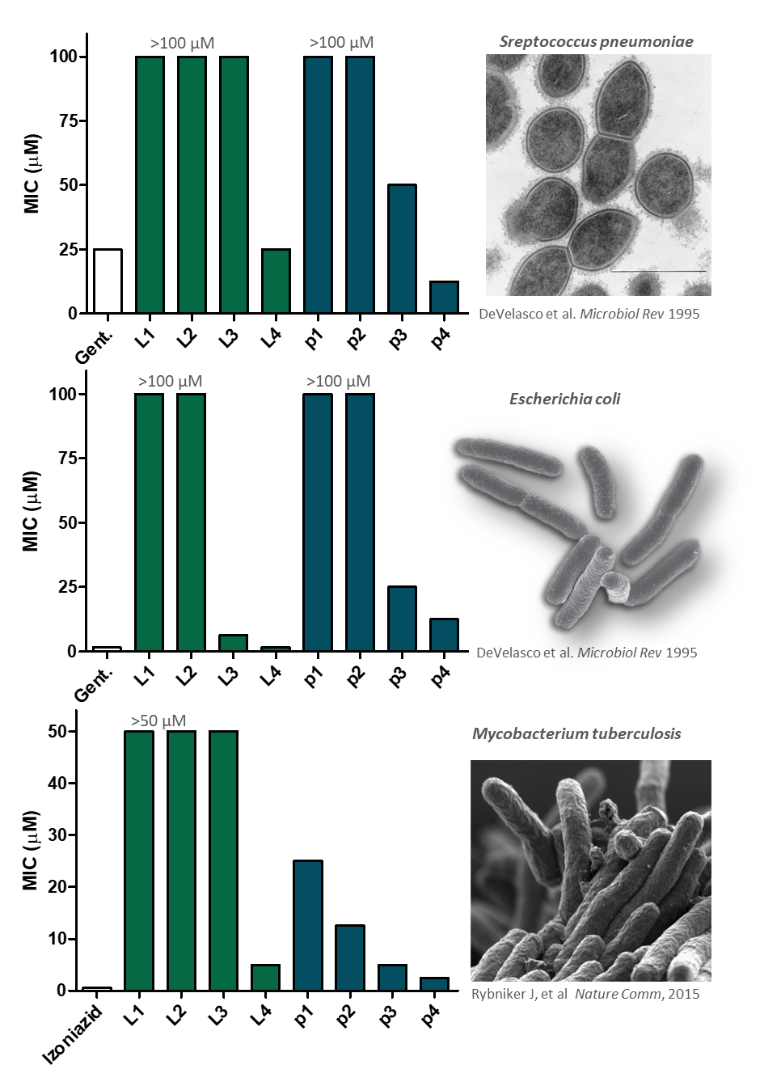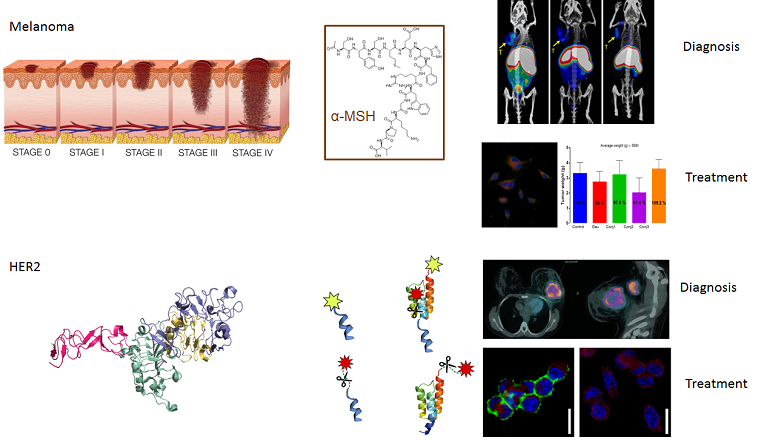403. Research laboratory
Head: Kata Horváti, Ph.D., Ildikó Szabó, Ph.D.
Address: Budapest, Pázmány P. sétány 1/A, 403.
Telefon: 06-1-372-2500/1429
Fax: 06-1-372-2620
In this laboratory peptide synthesis is the main activity. Synthetic peptides and conjugates are used in four research topics: (1) synthetic vaccines, (2) dendritic cell targeting, (3) peptide targeting - intracellular pathogens, (4) peptide targeting - antitumor conjugates
(1) Research and development of vaccines against a variety of infectious diseases, where the causative agent shows high antigenic diversity due to fast mutation rate or metamorphosis across variation of stages, are still challenging. Therefore, immunization with combination of antigens derived from all stages of the parasite's life cycle has crucial benefits. Multiple epitope containing polyvalent vaccines can induce a more effective and universal immune response. The causative agent of tuberculosis (TB) can render itself to a so-called dormant stage and remains in the human body for over decades after the infection. One third of the world's population is affected with this latent infection which comprises a significant reservoir of future epidemics, particularly in countries with high HIV burdens. In this project, epitopes derived from immundominant proteins expressed during the different stages of the pathogen are formulated in different ways and the provoked immune response is measured.
(2) Dendritic cells (DC) are the most potent antigen presenting cells that play important role in the antigen specific immune response, immunological memory and immune tolerance. Therefore, DC-based therapeutic applications have proven great potential. In the present research project peptides, which can target surface structures and specific receptors of DCs, are planned to be developed. Previously described DC-targeting peptides, that have been identified by phage display technology, will be modified by peptide chemistry-based derivatization and structure-activity relationship studies will be investigated with the aim of improving the targeting activity. Best DC-targeting peptides will be coupled onto the surface of multi-epitope vaccine conjugate-containing nanoparticels. The goal of this strategy is to improve the immunogenicity and overall efficacy of the vaccine constructs against chronic infections like tuberculosis.
(3) Targeting intracellular pathogens can be achieved by peptide conjugation of antimicrobial drugs. As carrier moieties cell penetrating peptides (CPP), antimicrobial peptides (AMP) and receptor specific peptides are used. The main project of the laboratory is the development of new conjugation strategies for clinically used or recently identified antimicrobial drugs. Besides, development of new antimicrobial peptides with improved bioavailability is also among the research topics.
(4) Targeted delivery of drug molecules with antitumor activity. These bioconjugates consist of special peptides to increase the selectivity of the drugs/diagnostics. These carriers are mostly receptor ligands (e.g. α-MSH,), or cancer cell surface specific ligands (primarily phage displayed peptides against HER2 or NG2). Our principal aims with these bioconjugates are increasing the killing of the tumor cells and decreasing the side-effects.
Selected publications:
1. Horváti K, Pályi B, Henczkó J, Balka Gy, Szabó E, Farkas V, Biri-Kovács B, Szeder B, Fodor K. (2019) A convenient synthetic method to improve immunogenicity of Mycobacterium tuberculosis related T-cell epitope peptides. Vaccines 7(3), 101.
https://doi.org/10.3390/vaccines7030101
2. Horváti K, Gyulai G, Csámpai A, Rohonczy J, Kiss É, Bősze Sz (2018) Surface layer modification of PLGA nanoparticles with targeting peptide: a convenient synthetic route for Pluronic F127 - Tuftsin conjugate. Bioconjugate Chem. 29(5):1495-1499.
https://doi.org/10.1021/acs.bioconjchem.8b00156
3. Horváti K, Bacsa B, Mlinkó T, Szabó N, Hudecz F, Zsila F, Bősze Sz (2017) Comparative analysis of internalisation, haemolytic, cytotoxic and antibacterial effect of membrane-active cationic peptides: aspects of experimental setup. Amino Acids. 49(6):1053-1067.
https://doi.org/10.1007/s00726-017-2402-9
4. Horvati K, Bősze Sz, Gideon HP, Bacsa B, Szabó TG, Goliath R, Rangaka MX, Hudecz F, Wilkinson RJ, Wilkinson KA (2016) Population tailored modification of tuberculosis specific interferon-gamma release assay. J Infection 72:179-188.
https://doi.org/10.1016/j.jinf.2015.10.012
5. Biri-Kovács, B.; Adorján, A.; Szabó, I.; Szeder, B.; Bősze, Sz.; Mező, G. Structure–Activity Relationship of HER2 Receptor Targeting Peptide and Its Derivatives in Targeted Tumor Therapy. Biomolecules 2020, 10(2), 183. https://doi.org/10.3390/biom10020183
6. Szabó, I.; Bősze, S.; Mező, G. Synthesis and in vitro evaluation of drug containing melanoma specific peptide conjugates (Ed.: Mező, G. Eötvös Loránd University, Budapest, Hungary) pp. 39-44 (2020)
Antimicrobial drugs
 Targeted delivery of antitumour drugs
Targeted delivery of antitumour drugs

